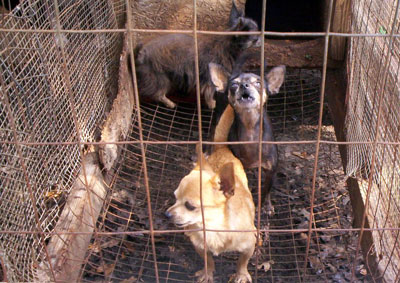how we must learn to re-inhabit our body and senses
![]()
by Derrick Jensen

(Editor’s caution: This essay may be triggering for those with a history of sexual abuse.)
NO ONE EMERGES FROM TRAUMA UNSCARRED. Having been severely traumatized, it becomes the work of at least a lifetime to de-normalize the trauma—to recognize it for the aberration it is—and to begin to re-inhabit your body, your senses, your mind, to re-inhabit relationships, to re-inhabit a world you perceive as having betrayed you.
Only recently have I learned that not everyone awakens in the night to listen for the sound of the door creaking open, or at four in the morning stares hard into the darkness of a room intentionally blackened, searching for the black-on-black of a silhouette. Throughout my twenties, I checked the room each night, and though I never found anyone hiding under the bed, or in the closet, I continued to enact the fear I learned as a child. Even now I often put my clothes hamper in front of the door, not expecting it to stop anyone, but instead mechanically manifesting my childhood prayer: Do not let him come for me when I sleep. Do not let him catch me unready. Let me be awake always, so when he comes, I can go away. A few nights ago I dreamed my father was raping me, saying again and again as he interminably came, “I am going to make you like me. I am going to make you normal.”
I have my poison; you have yours. Name it. Walk away from it. But it’s terrifying. There are landmines. I can see them, having grown up with them. There is barbed wire. I do not like this concentration camp, but I believe the world is no different.
Having passed through trauma, we have a choice we must revisit for the rest of our lives: attempt to de-normalize the trauma, or try to make the trauma feel normal. If the barriers are too frightening, the landmines too real, we can try to rationalize, to normalize what happened to us. This also helps rationalize what we’re doing to others. This process of normalizing is central to the fabrication of claims to virtue. It is also central to the way Western science and religion manifest themselves.
Examples of this normalization are as near as today’s paper. A local couple is on trial for animal abuse. After receiving complaints for a number of years, sheriffs raided their puppy mill. The officers found a dog with exposed bone where a fractured jaw had healed, several with protruding intestines, and several more with neck lacerations from constricting collars. There was one mother trying to feed nearly forty puppies. Thirty-five of the adult dogs had to be killed. The couple’s defense in court? They owned those dogs. They cited Psalms 8: “Thou madest him [man] to have dominion over the works of thy hands; thou hast put all things under his feet: All sheep and oxen, yea, and the beasts of the field; The fowl of the air, and the fish of the sea, and whatsoever passes through the paths of the seas.” The emphasis—that beasts of the field are things—is in the original.
The judge evidently had no choice but to find them guilty of some of the charges. He then delivered an attack which the newspaper called blistering. He did not attack the defendants but instead “overzealous animal rights activists” who called for justice in the first place.
What do you do, how tired do you get, when each day you struggle against an entire culture based on the normalization of trauma-inducing behavior? There is no sanctuary.
this essay was excerpted from A Language Older than Words
photo credits: Starry Sky © Manfred Konrad / iStockphoto
 Derrick Jensen is the author of The Culture of Make Believe, A Language Older than Words, Listening to the Land: Conversations about Nature, Culture, and Eros, a USA Today Critics Choice for one of the best nature books of 1995, As the World Burns: 50 Simple Things You Can Do to Stay in Denial, and How Shall I Live My Life?: On Liberating the Earth from Civilization. He writes for The New York Times Magazine, Audubon, and The Sun Magazine, among many others.
Derrick Jensen is the author of The Culture of Make Believe, A Language Older than Words, Listening to the Land: Conversations about Nature, Culture, and Eros, a USA Today Critics Choice for one of the best nature books of 1995, As the World Burns: 50 Simple Things You Can Do to Stay in Denial, and How Shall I Live My Life?: On Liberating the Earth from Civilization. He writes for The New York Times Magazine, Audubon, and The Sun Magazine, among many others.







0 Comments